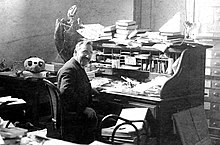
Back أوليفر بيري هاي Arabic الیور پری هی AZB Oliver Perry Hay Catalan Oliver Perry Hay German الیور پری هی Persian Oliver Perry Hay French Oliver Perry Hay Italian Oliver Perry Hay Polish Хей, Оливер Перри Russian Олівер Перрі Гай Ukrainian
Oliver Perry Hay | |
|---|---|
 Hay at his desk at the Carnegie Institution, circa 1920 | |
| Born | May 22, 1846 |
| Died | November 2, 1930 (aged 84) |
| Nationality | American |
| Alma mater | Eureka College (BA) University of Indiana (PhD) |
| Scientific career | |
| Fields | |
| Institutions | Carnegie Institution for Science |
Oliver Perry Hay (May 22, 1846 – November 2, 1930) was an American herpetologist, ichthyologist, and paleontologist.
Hay was born in Jefferson County, Indiana, to Robert and Margaret Hay. In 1870, Hay graduated with a bachelor of arts from Eureka College in Illinois. He taught at the college as a sciences professor from 1870 to 1873.[1] He married Mary E. Howsmon of Eureka, Illinois, in 1870. He was a professor at Oskaloosa College in Iowa from 1874 to 1876. He was a student at Yale University from 1876 to 1877. Seventeen years after earning his bachelors, he earned his PhD from Indiana University in Bloomington, Indiana. From 1877 to 1879, he taught at Abingdon College just before it was incorporated into his alma mater, Eureka College. His longest professorship was at Butler University from 1879 to 1892. From 1894 to 1895, he worked at the Field Museum of Natural History as assistant curator of zoology, where despite his specialty in ichthyology, he worked in all nonornithological fields of zoology. In 1912, Hay was appointed as a research associate at the Carnegie Institution for Science, and was given office space at the United States National Museum. There, he did much work with the USNM's collections in vertebrate paleontology. He published extensively on fossil turtles and Pleistocene mammals. The catalogs that he constructed were a great aid in recording existing knowledge and became standard references. His papers from 1911 to 1930 are stored at the Smithsonian Institution.[2]
Oliver and Mary had four children together.[3] Their son, William Perry Hay, was also a zoologist.
- ^ Alumni Association, Eureka College (1894). A History of Eureka College with Biographical Sketches and Reminiscences. St. Louis, MO: Christian Publishing Company. p. 173. ISBN 9783337388706.
- ^ Cite error: The named reference
coxwas invoked but never defined (see the help page). - ^ Lull, Richard Swann (1931). "Memorial of Oliver Perry Hay" (PDF). Bulletin of the Geological Society of America. 42: 30–48.